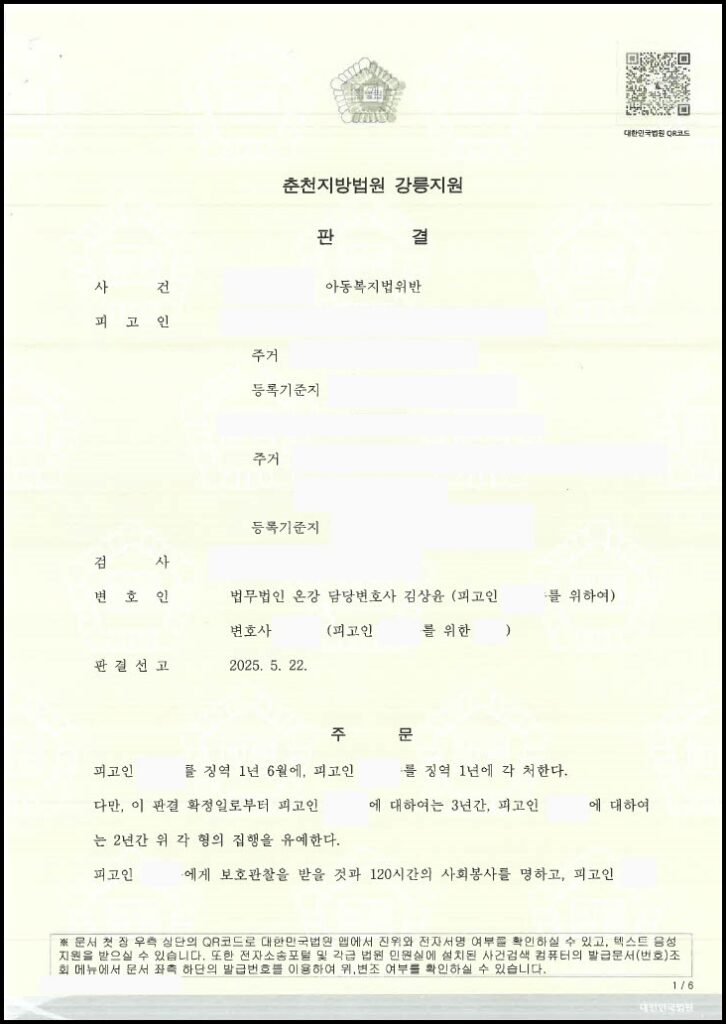Overview of the case (facts)
The client had unexpectedly given birth to a child in very difficult financial circumstances in the past and was involved in the process of entrusting the child's upbringing to others in a manner that violated the law because of a misguided belief that she could not realistically raise the child.
He realized the gravity of his actions and deeply regretted them, but was faced with the inevitability of severe punishment. He came to Ongang Law Firm to correct his mistakes, seek rehabilitation, and start a new life.
Case Issues (Case Features)
This was a case where the defendant admitted to the crime and was sincerely remorseful, but the crime of child trafficking was a serious offense and carried a high risk of imprisonment. The defendant's difficult upbringing, desperate economic situation at the time of the offense, first-time offender status, and medical condition were key issues in obtaining leniency.
Assistance from Ongang
In order to effectively convey his client's situation and sincere remorse to the court, Mr. Ongang focused on the following points in order to obtain the maximum possible sentence.
First, the client demonstrated sincerity through his multiple written reflections, in which he admitted to all charges and consistently emphasized from the outset of the investigation that he was deeply remorseful for his wrongdoing. He demonstrated that he accepted responsibility for the consequences of his inappropriate behavior.
Second, the defense detailed that the client was very young at the time of the offense, was living in an irresponsible environment, was experiencing extreme financial hardship, and was unable to get adequate support from his parents. The defense argued that these desperate circumstances led to a momentary lapse in judgment.
Third, the client explained the difficult circumstances that led her to give up custody of her child, emphasizing that her purpose in doing so was to cover the essential costs of having and raising a child and not to gain a large personal advantage, and that the monetary consideration obtained was relatively small compared to the price of child trafficking.
Fourth, we strongly argued that our client was a first-time offender with no prior convictions beyond a fine, and that he had been a good member of society prior to this incident.
Fifth, the client has demonstrated with objective evidence, such as hospital records, that he or she is currently in very poor health, requires ongoing medical care, and is at risk of significant deterioration in health if sentenced to prison.
Sixth, the client's family (mother and aunt) reflected on their failure to pay more attention to the client after the incident, and submitted a petition expressing their strong commitment to be by his side to help and care for him in the future so that he could live a righteous life, showing that he was supported and not socially isolated.
Seventh, in light of the totality of the circumstances, the defense argued that the client was deeply remorseful, posed a low risk of reoffense and was highly reformable, and should be given the opportunity to rehabilitate himself and live responsibly in society through probation rather than imprisonment. The defense also argued that a work restriction order would seriously impede the client's reintegration into society and requested a waiver.
■ Result
The court carefully reviewed Wong Kang's arguments and extensively acknowledged favorable mitigating circumstances, including the client's sincere remorse, difficult circumstances at the time of the offense, being a first-time offender with no prior convictions of his kind, his medical condition, and the pleas of his family.
As a result, the defendant was sentenced to one year and six months in prison, suspended for three years, ordered to serve 120 hours of probation and community service, and the employment restriction order was waived, allowing our client to avoid jail time and begin a new life in society.
Case outcome materials



